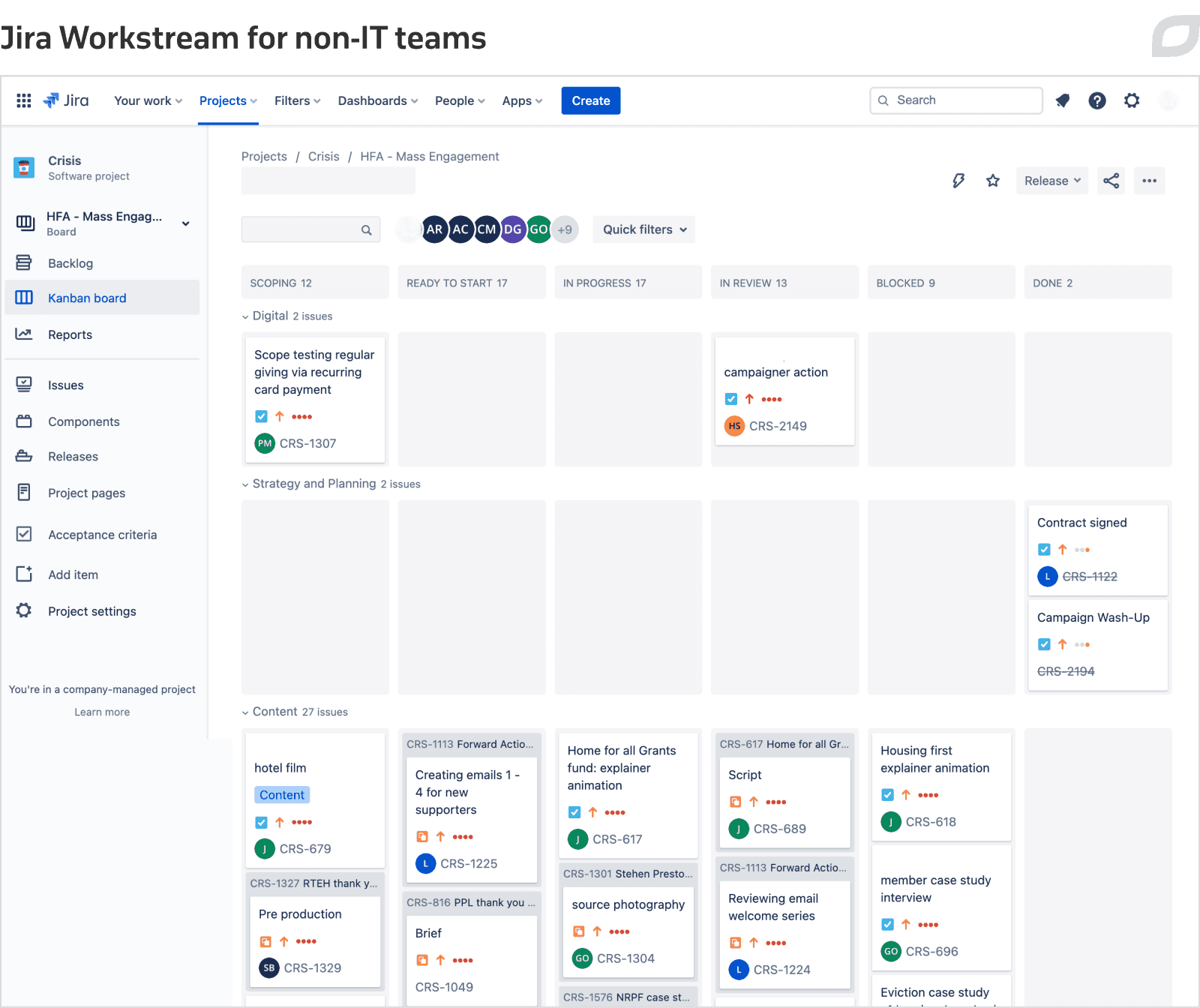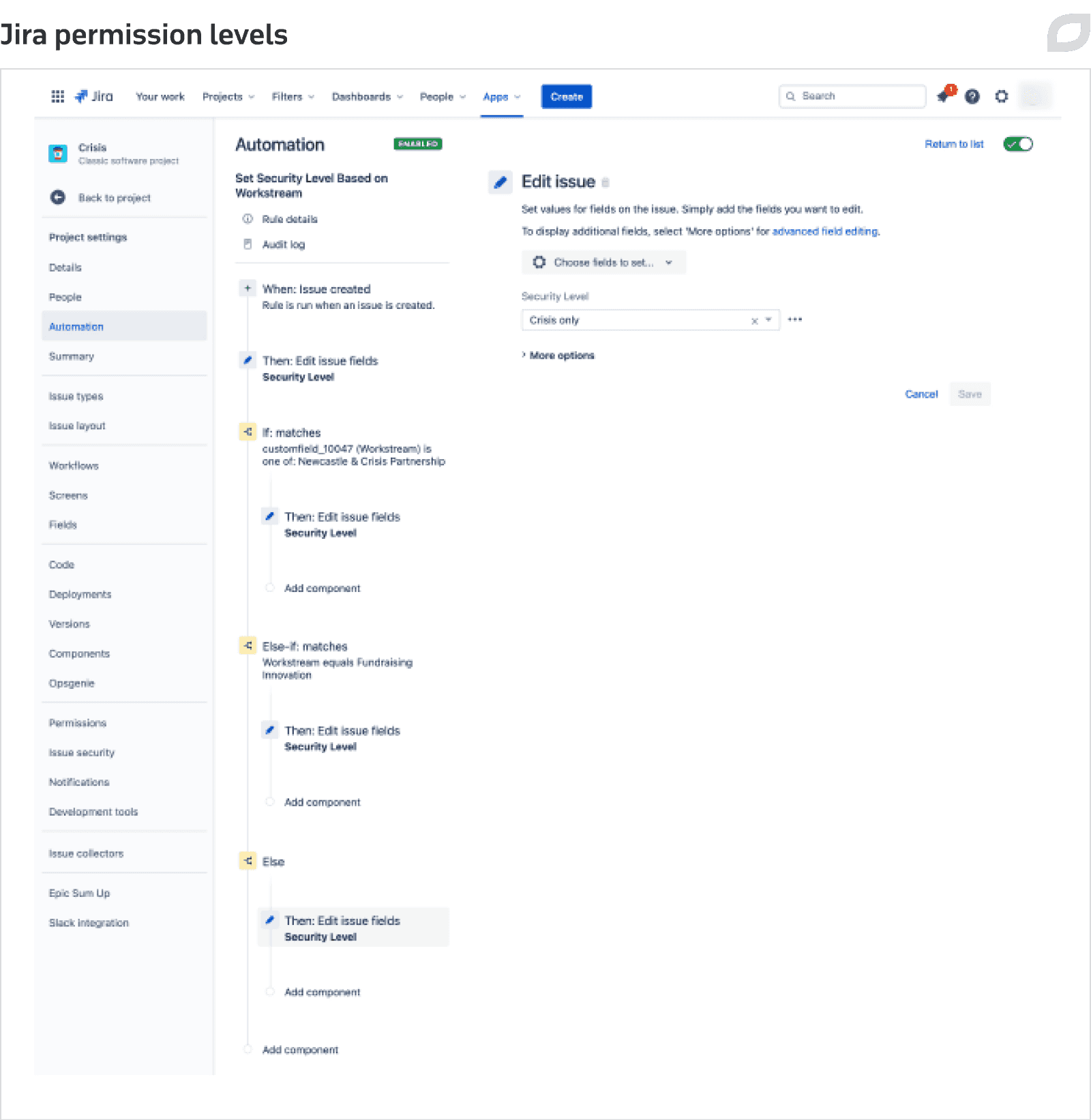
Atlassian-based agile transformation for a UK charity
Itransition helped the charity company Crisis optimize their Atlassian Jira and Confluence solutions, reducing their license costs by 75% and minimizing technical issue resolution time by 80%.
Context
Crisis is a UK nonprofit organization committed to ending homelessness. They work on a project-by-project basis, conducting research, carrying out charity campaigns, and doing other charitable work.
Shortly before turning to us, the company underwent Agile digital transformation and replaced their bloated project management stack with Atlassian Jira and Confluence to standardize project management processes and break down workplace silos. However, due to the limited knowledge of the tools’ functionality, Crisis’s employees set up workflows intuitively and not always correctly. As a result, the organization reached a deadlock in their Jira and Confluence adoption project.
This is why they were looking for a technology consultant to teach the staff how to use Atlassian products to their full capacity and optimize process management. Considering our Atlassian Gold Solution Partner status and related success stories, the customer chose Itransition to audit their processes, optimize workflows, and train employees accordingly.
Solution
Process audit
Itransition’s Atlassian experts started working with Crisis by holding interviews with their employees to gauge their experience with Atlassian products and their needs. The interviews allowed us to identify the following issues:
- A fragmented picture of the company’s operations because some performance metrics had never been gathered.
- Some processes overlapped because previously Crisis’s teams had relied on separate project management tools.
- The corporate Jira was bloated with an excessive number of projects, including old and abandoned ones.
- Employees didn’t use issue estimation and time tracking features in Jira.
To get a full view of the company’s operations, Itransition also studied how Crisis’s IT team works with corporate processes. Proceeding from the results of both interviews and process analysis, we created a roadmap for process optimization with Jira and Confluence in line with Agile principles.
Process optimization
Our team began by cleaning up and configuring the IT team’s Jira workspace. We archived all legacy projects and removed unused fields, duplicate statuses and workflow steps. We left only seven statuses in the IT workflow — Backlog, Analysis, Selected for Development, In Progress, Testing, Ready to Deploy, and Done, which are sufficient for Jira projects administration and end-to-end visibility.
Next, our consultants focused on non-tech workflows. Since non-IT teams don’t need the full Jira functionality, we tailored the tool to their needs and removed unnecessary features to make it more user-friendly.
We also changed Jira status availability properties to allow Crisis's employees to transfer issues from across projects to a single board regardless of their dependencies. Apart from this, our team introduced a set of simplified workflow templates, tailor-made to internal customer processes to standardize the Jira setup and streamline project creation, tracking, and migration to workflows.
Finally, we created a separate non-IT Jira project with Agile boards based on Jira filters. Each of these boards represents a Workstream, a custom Jira field that we added to divide the customer’s departments or activities. This allows Crisis employees to comfortably work across several boards at a time.

Security consulting
Our Atlassian experts reviewed Crisis’s security and permission schemes for Jira and Confluence instances and gave recommendations on how to align them with Crisis's internal processes. We also advised Crisis to assign one or two group admins who could manage users, view and change global and project permissions, create new projects, and archive old ones.
We also recommended the customer to group project users and assign individual permission levels to each group. This way, they could limit the visibility of sensitive information across different teams and prevent confidentiality breaches.

Atlassian license management
We analyzed the customer’s current Atlassian subscriptions as well as the number of employees using the products and recommended ways to reduce the incurred license payments by as much as 75%. Itransition also helped Crisis get a discount for all Atlassian products they use, which saves them a significant amount of money monthly.
One-time and ongoing user training
To help Crisis’s employees make the most of their new infrastructure, we conducted training sessions on effective usage of Jira and Confluence and held project and product management Scrum/Kanban workshops.
We devised a bespoke training series, taking into account the customer’s business profile and employees’ feedback we collected during their Atlassian product interviews. Our Jira and Confluence training included the description of tools’ basic features and reporting capabilities and the demonstrations of Jira functions helpful for working with Scrum, Kanban, or mixed-type Agile projects.
Our guidance helped Crisis’s employees understand how to significantly streamline their project management activities with Atlassian products.
Now, we continuously support the customer in their Atlassian journey, holding additional on-demand Jira and Confluence administrator training sessions.
Results
Within six months, Itransition conducted a thorough analysis of Crisis's operations and introduced relevant changes in the company’s project management workflows to help them power Agile transformation and use Atlassian products more efficiently. We also held organization-wide Jira and Confluence adoption training for employees.
During the collaboration with Crisis, we achieved the following results:
- We tripled the number of Crisis’s Atlassian users.
- We reduced the time the Crisis IT team spent on resolving technical issues by 80%.
- We lowered Crisis’s Atlassian license costs by 75%.

Services
DevOps consulting
Go for DevOps-as-a-Service with Itransition. We provide full-cycle DevOps automation to help you adapt business processes and resources.

Case study
Atlassian-based DevOps transformation
Learn how Itransition helped a customer from the airline industry with DevOps transformation and team collaboration based on Atlassian products.

Case study
Atlassian consulting for a UK software development provider
Learn how Itransition’s Atlassian experts helped the customer optimize their software development by customizing their Jira and Confluence solutions.

Case study
Occupational safety incident management software
Find out how Itransition delivered a Jira-based incident management system for an oil and gas company.

Case study
Jira implementation for Nakamoto & Associates
Learn how Itransition helped the Oracle Cloud consultant with Jira implementation to improve their agile software development project management.

Case study
Custom database development for a healthcare charity
Learn how Itransition’s custom database development provided healthcare professionals with accurate data on defibrillators within their areas.